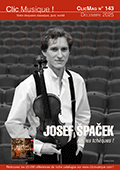 Confiné au registre de compositeur pour violon, Jean-Marie Leclair (1697-1764) a le mérite d’une vie romanesque : né à Lyon dans une famille de musiciens passementiers, danseur et violoniste à la cour de Turin en 1722, il acquière un stradivarius que l’on nommera « le Noir ». Dès 1723 il publie sans discontinuer des sonates et concerti pour cordes avant de s’installer à Paris en 1728 où, 1er violon du Concert Spirituel, Leclair magnifie la technique corellienne de l’archet. « Violon du Roy » en 1733, année où Rameau crée « Hippolyte et Aricie », un temps à La Haye (1738-1743) chez Anne d’Orange bienfaitrice de Haendel, il se fixe définitivement à Paris où il brille comme le premier violoniste de son temps jusqu’à son assassinat non-élucidé en 1764, année de la disparition de Rameau ! En 1746, il crée son unique tragédie lyrique « Scylla & Glaucus », sortie des bibliothèques par Gardiner en 1986, et à laquelle ce disque rend un hommage appuyé, avec la transcription originale de l’ouverture pour deux violons et basse continue ou de danses. Le Concert Universel, sous la conduite brillante de la violoniste suisse Juliette Roumailhac, nous brosse ici un magnifique portrait que l’on aurait aimé composé d’œuvres plus originales et surtout mieux équilibré ; la prise de son laissant en sfumato le très beau continuo du claveciniste Brice Sailly. (Florestan de Marucaverde)  A brilliant dancer before becoming “famous throughout Europe for his learned and elaborate sonatas, and for the elegance of his performance on the violin”, Jean-Marie Leclair is far more than the sum of his talents. His music is woven with the multiple threads of his life, carrying within it all the facets of his technical and musical explorations, his travels, his impressions, which have moulded man as much as musician. “You should have seen him, at sixty-seven years of age, performing with astonishing gusto, communicating his energy to the whole orchestra, and [...] savouring the pleasure of being admired, with that modest and pure joy that so befits a young man being praised for the first time”. It is the man, of “noble simplicity”, alert and passionate to the end of his life, as much as the musician-dancer, fertile creator of virtuoso elegance, that this recording wishes to portray. His music, too rarely played, brings together the brightness of Italy, French taste without the rigidity of etiquette, love of the violin, of sound, and virtuosity that always allows poetry and beauty to take precedence.
 |
